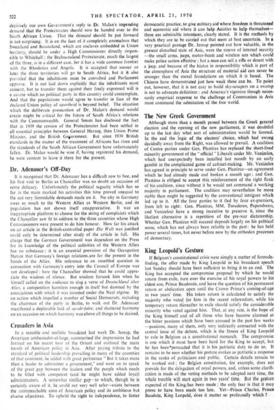Crusaders in Asia
In a sensible and realistic broadcast last week Dr. Jessup, the American ambassador-at-large, summarised the impressions he had formed on his recent tour of the Orient and outlined the main trends of American policy in Asia. After paying tribute to the standard of political leadership prevailing in many of the countries of that continent, he added with great pertinence " But it takes more than a leader to administer a government," and went on to speak of the great gap between the leaders and the people which needs to be filled with competent (and he might have added loyal) administrators. A somewhat similar gap—to which, though he is certainly aware of it, he could not very well refer—exists between the unimpeachable aims of American policy and its ambitious but elusive objectives. To uphold the right to independence, to foster democratic practice, to give military aid where freedom is threatened and economic aid where it can help Asiatics to help themselves— these are admirable intentions, clearly stated. It is the methods by which they are to be carried out that seem at best uncertain. In a. very practical passage Dr. Jessup pointed out how valuable, in the present disturbed state of Asia, were the sinews of internal security —the small arms, jeeps, motor-boats and wireless sets which could make police action effective ; but a man can sell a rifle or desert with a jeep, and because of the hiatus in responsibility which is part of the atmosphere of Asia the structure of material aid can never he stronger than the moral foundations on which it is based. The Chinese have demonstrated just how weak these can be. To point out, however, that it is not easy to build sky-scrapers on a swamp is not to advocate defeatism ; and America's vigorous though neces- sarily empirical response to the challenge of Communism in Asia must command the admiration of the free world.






































 Previous page
Previous page